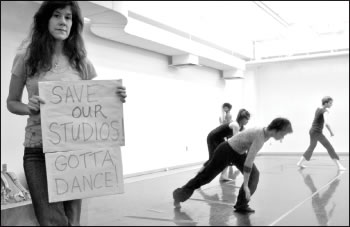BY John Bayles
Kate Pelia, Dance New Amsterdam’s executive director, has adopted a new life philosophy.
“Life is an Excel spreadsheet. What you do is you gather the data and you fill in all of your little units, then you see what weighs heavily in certain areas,” she said.
Pelia feels as if this is how the city is currently evaluating nonprofits throughout Lower Manhattan.
D.N.A. is facing eviction; the court hearing is scheduled for this Thursday. It’s not D.N.A.’s first date in landlord-tenant court. They were scheduled to appear on July 14, because their landlord, Fram Realty, was suing them for possession of premises due to rent arrears of more than half a million dollars.
With the help of local elected officials, like council member Margaret Chin and state Senator Daniel Squadron, Pelia was able to stave off the first court appearance and buy her group some time. But now, the Lower Manhattan arts group is again in need of help.
As of press time, Pelia was awaiting a counter offer from Fram, but the court date, she said, was still set.
“We have a counter offer coming in today,” Pelia told the Downtown Express on Tuesday. “It will have two aspects. One is the city would step in with a solution other than a tax abatement. And one would be if the city doesn’t.”
Initially, D.N.A. and their supporters were lobbying for a special tax abatement reserved for nonprofits. The problem though is the tax break is only given to nonprofits that own the space in which they operate.
The first sit-down with Fram, that only came once elected officials began applying pressure in July, resulted in the landlord offering to lower D.N.A.’s rent from $70,000 a year to $50,000 for the first five years and $55,000 for the second five years of a ten-year lease. Pelia said while the offer was appreciated, it still wasn’t good enough to save her organization.
Cultural Darwinism
Pelia feels D.N.A., as well as many other groups in Lower Manhattan, is suffering from what she deems “cultural Darwinism.”
“Funders are allowing the weaker organizations to die off to see whose left standing. We have set up a system based on creating businesses that provide a service and promote the public good,” said Pelia. “But there is a systemic problem that must be addressed. People don’t want to admit that we have a legal system set up to make us ask for support.”
I really believe something needs to be done about how New York City is doing business with its culturals,” she continued. “It trickles down to families, to artists.”
What frustrates Pelia most however is that she sees D.N.A. as a proven business model when it comes to the arts.
D.N.A.’s 130-seat theater has showcased over 380 D.N.A. performances and an additional 200 performance by other groups that rent out D.N.A. studio space. They are open 360 days a year and offer 120 classes weekly with upwards of 8,000 students enrolled on an annual basis. The non-profit currently serves over 32,000 people, provides jobs to 250 employees and bankrolls project and commission work that adds more than 400 additional jobs every year. The organization’s payroll is $1,508,000, which equals $281,658 a year in government employee taxes.
“The child who is pushed out into the street first,” said Pelia, “will turn to the easiest way of making money. We’re not doing that.”
Pelia said some peers an others are telling her to go the way of other nonprofits in the same situation.
“People are saying we should [go] bankrupt.”
Pelia said there’s an old Russian saying that has taken on new meaning for her in the past months.
“If you don’t know what kind of snakes are in the river, then don’t jump into the river.”
Then she said, “New York City is a river, and there’s a lot of bad snakes in it.”
For now Pelia, her staff and D.N.A. students and teachers are simply waiting. Pelia is continuing to hone her skills as a researcher.
“I’m becoming a real estate mogul, doing forensic research on ULURP [Uniform Land Use Review Procedure],” she said.
But for Pelia that’s a problem; she is spending more time on research than she is on programming.
“How do we make the world a better place?” she asked, and then firmly said, “The one thing I know is it’s not by getting rid of the arts.”

































